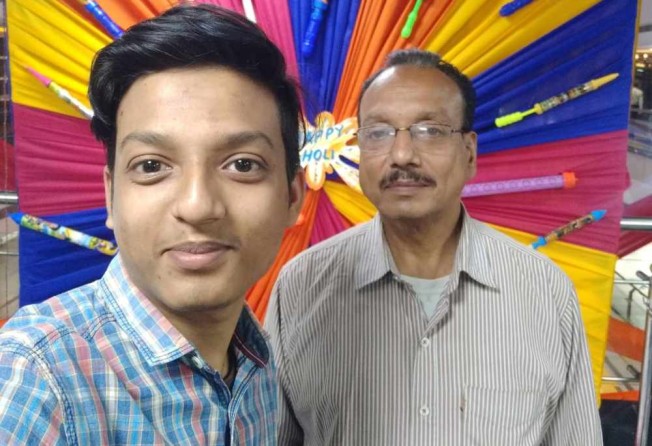
As a second wave of coronavirus overwhelms India’s hospitals, desperate relatives turn to WhatsApp for help
- With beds, ventilators and oxygen drying up, relatives of those infected with Covid-19 describe a health system in collapse
- As medical helplines are swamped, many seek information from social media, where advice may be well-intentioned but is often out-of-date
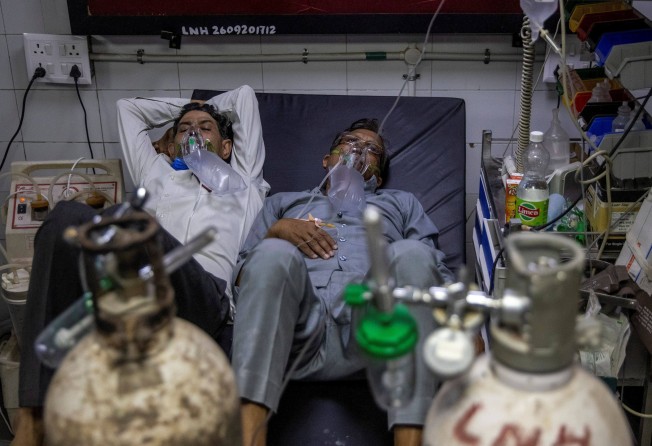
On the last day of his father’s life, in between frantically working the phones to find a hospital bed, Swapnil Rastogi, 26, kept patting and reassuring him. He could see the panic in his eyes as his oxygen level kept dipping. “Papa, please be patient, please hold on. We will get you on a ventilator,” he kept saying.
Rastogi’s efforts to find treatment for his father were in vain. Raj Kumar Rastogi, 59, died in his Lucknow home on Monday at 11pm. His last words were “Have you bought any oranges for your mother?”.
Voicing a bitterness that is felt across the country as India struggles to cope with a second wave of coronavirus infections, Rastogi said: “It wasn’t the virus that killed my father, it was the lack of treatment. I ran to a dozen hospitals but couldn’t find a bed for him. The system has collapsed.”

Residents in Lucknow, the capital of Uttar Pradesh state, are meant to contact the bombastically named Integrated Command Control Centre, run by the government, to find out which hospital has beds for Covid-19 patients.
With no one answering the centralised phone line because it was inundated with desperate callers, it was social media that Rastogi turned to during the 10 days that his father was ill.
All over India, the relatives of Covid-19 patients have been trying the medical helplines for information on beds but the entire system has been so overwhelmed that in desperation, they turn to the alternative emergency helpline: WhatsApp.
The messaging app is awash with helpline numbers, advice on which hospital might have an ICU bed, a ventilator, or plasma in response to anguished pleas for help from families who are seeing their loved ones deteriorating in front of their eyes.
“Please, this is urgent. My husband is in bad shape. His oxygen levels are dipping. Please help me to get oxygen for him immediately,” a woman posted in her New Delhi neighbourhood association’s WhatsApp group. A neighbour managed to locate oxygen but at three times the normal price.
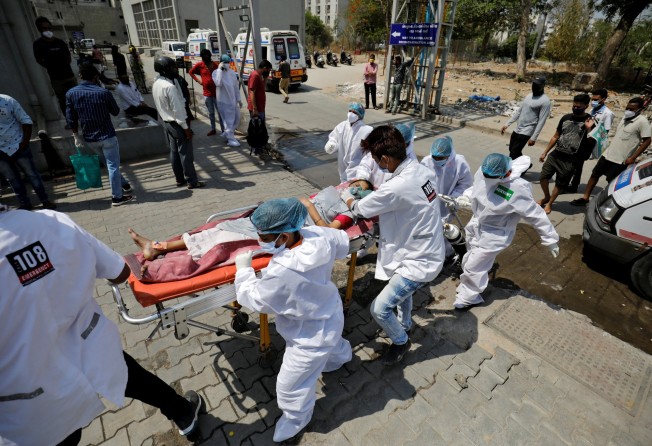
While the desire to help is genuine, Rastogi also discovered that since so many posts are being forwarded without being checked, many of the numbers are wrong and some of the information about beds and oxygen supplies is also wrong, adding frustration to panic.
The catastrophe of India’s second wave set grim records on Tuesday. In that single 24 hour period the country recorded more than 300,000 fresh infections and 2,000 deaths. The capital New Delhi alone reported 28,395 cases and 277 deaths. According to official figures, more than 181,000 Indians have now died from the disease.
Far more brutal than the first wave last year, the unprecedented surge in cases has overwhelmed even the best private hospitals and turned wards and corridors into war zones. In hospital car parks and on the road outside, people huddle, looking like refugees, waiting for a bed or for information about their loved one inside.
Everything is running out – beds, medicines, and oxygen. Even testing has become a nightmare as the labs are besieged. “I called the lab and was told not to go and give a swab till next Monday because they had a backlog of 8,000 samples,” said Swati Arora, 28, in New Delhi.
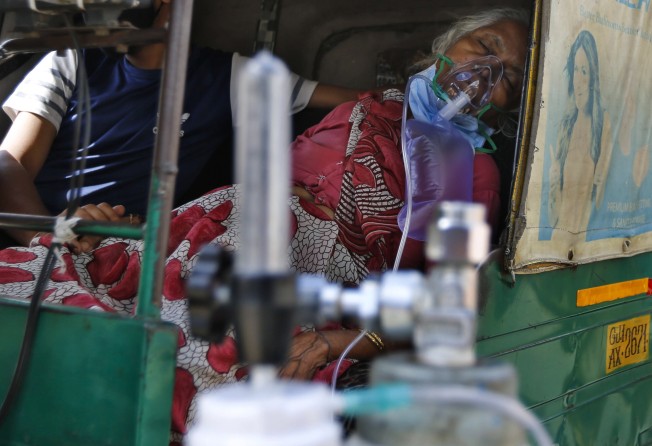
Arora’s parents, in their late 60s, developed Covid-19 symptoms over the weekend at their Nizamuddin East home and she is certain they have been infected. If they develop breathing problems and need hospital treatment, no hospital will admit them without a Covid-19 positive report. Yet it is near impossible to get a test done as the labs are flooded.
“In the three to four days it is taking for patients to get the result, their condition can worsen fast. By the time they reach us, it’s impossible to salvage the situation,” said a doctor at Fortis Hospital who asked not to be identified.
In cities all over the country, Indians are begging and pleading for beds and oxygen. “I bent down and touched the feet of the woman behind the hospital counter and begged her to save my mother, to let her lie on the floor if there was no bed as long as she got treatment,” said a young woman in Bhopal. Her mother died in the ambulance parked outside the hospital.
In Mumbai, Susheela Mehta, the wife of a garment exporter who lost her sister to Covid-19 last year, keeps her ear plugs on. “All day, I hear ambulance sirens. It makes my nerves jangle so much when I think of that person inside struggling to breathe.”
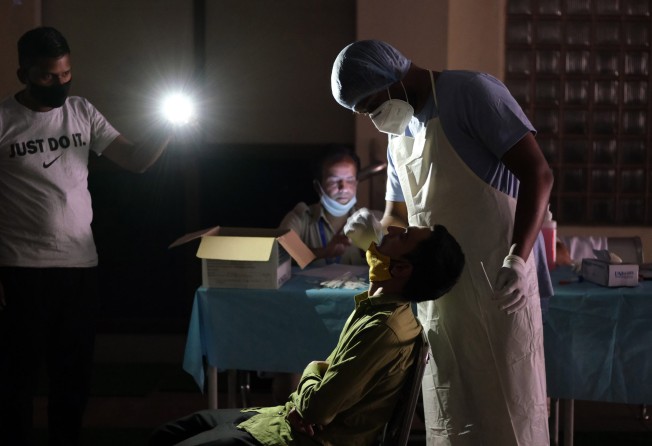
‘WE HAVE NEVER BEEN SO HELPLESS’
Many doctors and nurses are close to breaking down. Burnt out and emotionally drained, they say they have never seen anything like this before. A woman doctor in Mumbai broke down on the NDTV news channel while talking about one of her patients, a 35-year-old man on a ventilator. “This emotional breakdown we doctors are feeling is because we have never been so helpless before,” she said.
Rastogi felt the same helplessness with his father. On April 12, he managed to find a bed in a small private hospital. The next day, the hospital told him to take his father home as it was about to run out of oxygen. He found another bed but it was in an isolation ward with no oxygen.
His father’s oxygen saturation levels dipped to 80 per cent (normal levels are usually above 90 per cent). Choking with grief and alternating between sorrow and anger, Swapnil said his father, a small businessman, had donated 20,000 rupees (US$265) to Prime Minister Narendra Modi’s PM Cares (Citizen Assistance and Relief in Emergency Situations) Fund, set up to fight the pandemic.
“Modi has been busy campaigning in state elections while my father was dying. He donated to the fund but couldn’t even get oxygen for himself to breathe,” said Rastogi.
Angry reactions of this kind, along with stories of grief and pictures of distress, have been flooding social media: sick patients lying on park benches or in hospital car parks or dying in ambulances or autorickshaws.
Sumit Kumar in Lucknow shared a photo of his elderly father, a journalist, sitting in the back seat of his car attached to an oxygen cylinder while they drove around the city looking for a bed. The look of mortal terror in his father’s eyes said it all – will I ever come home? He died in the car.
You. Are. Responsible. Mr. Prime Minister.#ResignModi pic.twitter.com/l9qMyeDndn
— Bipul Roy (@banglargarbhoma) April 19, 2021
On Twitter, pictures of massed funeral pyres burning inside crematoriums are being shared with the question ‘Who is responsible for this?’
On Tuesday evening, Modi addressed the nation on television to express his sympathy for those who had died. He called the second wave “a storm” and promised to improve the supply of oxygen.
A long list of hospitals, even the top private ones, having warned that they have only a few hours worth of oxygen left, are waiting to see if the promise holds good.
Late on Tuesday night, the GTB hospital in the capital received a truck of oxygen cylinders just as it was about to run out. On seeing it, doctors wept.